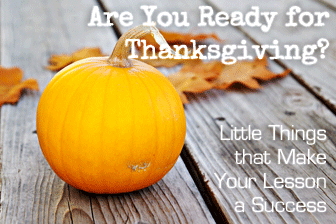Are You Ready for Thanksgiving? Little Things That Make Your Lesson a Success

This is especially true if you are teaching a particular type of English, such as business English. By working on a specific theme, the students can get a break from what they normally learn. It can also be a great way to introduce some interesting new concepts to the class, and can have great conversation starts. Particularly if you are talking about the likes of festivals, there may be a lot of funny stories to tell. This will indeed help to boost the student’s talking time, and cut down on teacher talking time especially if you ask. When teaching children, this can be an excellent time to go more in depth about certain things such as the seasons, and of course the weather. Since all children love story telling, this might be an excellent way to get them excited about learning English.
Thanksgiving Ideas
Whether you’re teaching in the United States or abroad, this is always a good way of sprucing up a class. Thanksgiving isn’t known to everyone around the world, so you might have to do a little bit of explaining in this regard. Telling a brief story to the students, letting them know the basic history of it, will allow them to understand any further exercises which are based around the topic. Printing off an article from the Internet is usually a good idea, although the length of it will depend on the time constraints you’re working under. Be sure to give everyone their turn to read, and jot down any vocabulary that the students may not be familiar with.
When it comes to children, there is a lot we can do. Most children probably won’t be interested in reading long articles, so it is important to approach this in a different manner. As stated before, story-telling is probably a brilliant asset. Again, remember, the point is to be creative: have the child make different scenes from the story of the Pilgrims’ journey on the Mayflower. Get them to colour them in and, if possible, see if they can write down a few words beneath the pictures to help with the story (you may want to use these Thanksgiving borders). The children probably won’t even think of this as a lesson, as most will revel in art! You could either post the pictures on the walls of the classroom, or perhaps photocopy pages into a scrap book and give them to the students to take home.
Seasonal Changes and Revision
With lower level learners of English, this can be a great opportunity to work with teaching conjunctions, comparatives and superlatives: The weather is colder than the summer. It was warmer during the summer.
Often, students will need time to go over what they had learned in the past, in order to refresh their memories. Making comparatives with the differences between winter, fall and summer are also a good idea: The fall is cold, the winter is colder, but December is the coldest.
Incorporating games in the class can also help, particularly if it is coming up to the holiday. Students around this time tend to get agitated and don’t really concentrate, therefore it is important to keep their minds focused on the task at hand. These are often quite popular ways of helping the students to relax but remain focused at the same time. Here is one game idea related to the upcoming season.
Christmas Songs
For the majority of learners, music tends to be a helpful way of learning. But now it is time to turn the tide. A “fill in the gaps” activity might work with an older crowd, as it can get everyone loosened up. Find a popular Christmas song and print out the lyrics. Be sure to pass it around to everyone in the room. Remember, however, to keep certain grammatical points out so that the students have to figure it out for themselves. If they are having trouble, you try and elicit the word as much as possible.
November Around the World
The United States has a lot of important dates during November, such as Thanksgiving and Veteran’s Day. But it is also important to try and learn a little about the culture you are working in at the moment. Perhaps ask the students what big events are available in their country. In Germany, for example, Carnival begins on the eleventh of November and usually celebrated until February. If you are teaching in a country like Germany which has festivals like this, do some research on the topic. It possible that the students will know more, so don’t be afraid to ask. Presenting basic facts first is a good idea, but then getting the individual students to tell you their own personal stories about this time of year will help them to practise speaking the language, and you could learn something new!